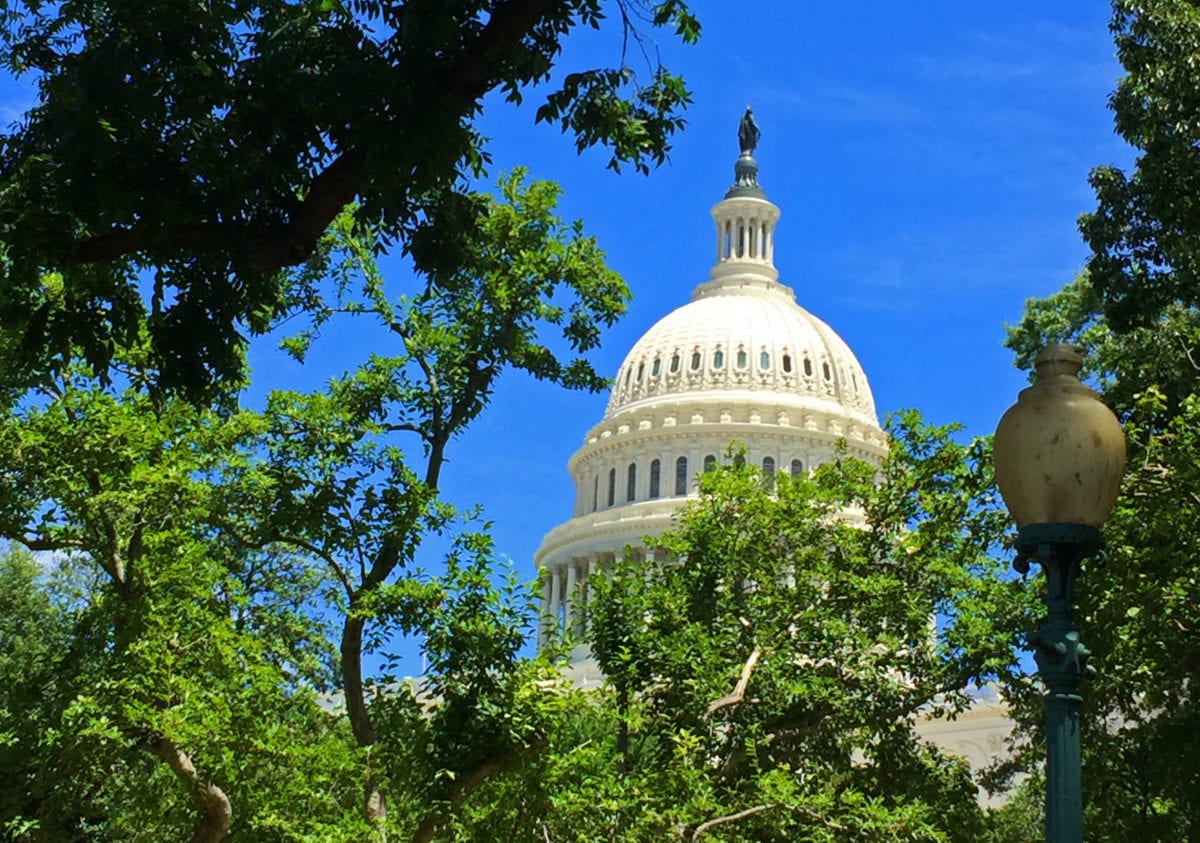By Glynn Wilson –
WASHINGTON, D.C. – People have been complaining about “dysfunction” in Washington, well, since George Washington was drafted to become the first president of the United States.
Politicians who want to come here to the so-called swamp, for all kinds of strange reasons, have been campaigning on the issue for decades.
Candidate Donald Trump complained about the “total dysfunction in Washington” on Twitter and in every campaign stop in 2016, while claiming only he could fix it.
Well, listen up. Do we have some important breaking news for you.
The dysfunction in Washington is in full throttle, and not much is working in the U.S. government. Of course now, predictably, President Trump is being blamed for most of it, although Senate Majority Leader Mitch McConnell has to shoulder his share of the blame.
There are entire segments in the mainstream media being devoted to the subject, including this one on PBS, which claims: “Dysfunction reigns on the Hill, as President Trump refuses to work with Congress unless all oversight investigations are dropped. Washington Post columnist E.J. Dionne and congressional expert Norman Ornstein discuss what this means for the survival of U.S. institutions and American governance.”
E.J. Dionne & Norman Ornstein on Dysfunction in Washington
Do a Google search for “dysfunction in Washington” and you get more than 43 million results, although due to the well documented problems with Google, half of those have to do with “erectile dysfunction.”
It’s hard to know how big a problem erectile dysfunction is in Washington, although it’s not hard to imagine that the “#MeToo” movement may be contributing to it.
But on a more serious note, Alabama and Washington’s newest Senator, Birmingham Democrat Doug Jones, who has only been in town for a year and a half since besting Republican Roy Moore in the special election in 2017, has become so frustrated with the dysfunction in Washington that he took to the Senate floor this week to complain about it.
He requested a vote by unanimous consent on his bipartisan bill to eliminate the military widow’s tax during deliberations on the National Defense Authorization Act, but his request was blocked by Senate Majority Leader Mitch McConnell even though it has 75 co-sponsors, three-quarters of the members of the 100-member Senate.
“I am incredibly frustrated that my request to pass the military widow’s tax repeal was blocked,” Senator Jones said in response. “This is sadly indicative of a bigger problem we have in the Senate where we don’t vote on amendments and the only bills that can get to the floor for a vote are simply the result of back-room political deals.”
In a media conference call with reporters on Thursday, the frustration of Senator Jones came to a boil as he expressed anger with the Republican leadership.
“I tried my best to force a vote, almost shame a vote … but we can’t get it on,” he said. “That’s how dysfunctional this place is on occasion.”
“Everything about this has been incredibly frustrating, as frustrating as three government shutdowns, delays in disaster relief,” he went on. “Quite frankly no wonder the American people think Congress and Washington are so broken.”
“If we can’t fight for military widows who are having their survivor benefits short-changed,” he said to reporters, “I just don’t know who the hell we’re talking up and speaking for these days.”
The Senator highlighted the plight of Cathy Milford of Mobile, Alabama, who is one of more than 65,000 military wives who have been affected by a VA policy of denying full survivor benefits from the Department of Veterans Affairs in the case of widows and widowers.
She is a retired school teacher whose husband died 25 years ago from a service related illness not long after retiring from the Coast Guard.
“Every time I talk about this issue, I have to dig my husband up and bury him all over again,” she says.
The Senator is encouraging the House to take up the cause and says he’s not giving up yet.
Senate Votes to Block Arms Sales to Saudi Arabia
Meanwhile, when the floor was opened for questions, I had a few, starting with an ongoing dispute between the White House and the Senate on arms sales to Saudi Arabia.
According to previous coverage you may have seen in the New York Times and other news outlets, the Senate voted recently to block the sale of billions of dollars worth of arms and ammunition to Saudi Arabia and the United Arab Emirates, in what news outlets are calling “a sharp and bipartisan rebuke of the Trump administration’s attempt to circumvent Congress to allow the exports by declaring an emergency over Iran.”
In three back-to-back votes, Republicans joined Democrats to register their growing anger with the administration’s use of emergency power to cut lawmakers out of national security decisions, as well as the White House’s unflagging support for the Saudis — despite congressional pressure to punish Crown Prince Mohammed bin Salman after the killing in October of Jamal Khashoggi, a stringer and columnist with the Washington Post in the Middle East who the New York Times has called a “dissenter” and activist as well.
A recent United Nations report made the most authoritative case to date that responsibility for the killing and its cover-up lies at the highest levels of the Saudi royal court, of course with an apparent wink and a nod from Trump not covered in the report or anywhere else.
“No other foreign policy issue has created as large a rift between President Trump and Congress, and the vote to block the arms sales deepens the divide,” the Times wrote. “It is the second time in just a few months that members of Mr. Trump’s party have publicly opposed his foreign policy, with both the House and Senate approving bipartisan legislation this spring to cut off military assistance to Saudi Arabia’s war in Yemen using the 1973 War Powers Act, only to see it vetoed.”
While the Democrat-controlled House is also expected to vote to block the sales, Mr. Trump has pledged to veto the legislation, and it is unlikely that either chamber could muster enough support to override the president’s veto. Seven Republicans — not nearly enough to override a veto — broke from their party to disapprove of the sales to Saudi Arabia: Senator Susan Collins of Maine, Senator Lindsey Graham of South Carolina, Senator Mike Lee of Utah, Senator Jerry Moran of Kansas, Senator Lisa Murkowski of Alaska, Senator Rand Paul of Kentucky and Senator Todd Young of Indiana.
“This vote is a vote for the powers of this institution to be able to continue to have a say on one of the most critical elements of U.S. foreign policy and national security,†said Senator Robert Menendez of New Jersey, the top Democrat on the Foreign Relations Committee and lead sponsor of the resolutions of disapproval. “To not let that be undermined by some false emergency and to preserve that institutional right, regardless of who sits in the White House.â€
The White House announced the sales late last month, and invoked an emergency provision in the Arms Export Control Act to allow American companies to sell $8.1 billion worth of munitions in 22 pending transfers to the three Arab nations. Saudi Arabia and the United Arab Emirates are waging an air war in Yemen that has come under sharp criticism from Congress and human rights organizations.
Members of Congress from both parties have been holding up arms sales from American companies to Persian Gulf nations and trying to end American military support for the Saudi-led coalition that is fighting Houthi rebels in Yemen, which has resulted in what the United Nations calls the world’s worst man-made humanitarian disaster.
By declaring an emergency over Iran, the administration was able to override those holds.
“If we let this emergency declaration go without protest, without a vote, I don’t know that we’re ever getting the power to oversee arms sales back as a body,†said Senator Christopher S. Murphy, Democrat of Connecticut, and one of the authors of the resolution.
Secretary of State Mike Pompeo had pushed hard for the emergency designation, over the objections of career Foreign Service officers and legislators, arguing that the sales would support allies like Saudi Arabia to counter Iran and its partner Arab militias — though some of the munitions would take years to produce and deliver.
In the weeks after the declaration was announced, lawmakers scrutinized the role that a former Raytheon lobbyist played in the decision.
Some Senate Republicans endorsed the administration’s position, arguing that rejecting the arms sales would be overly blunt with unintended consequences as tensions with Iran escalate.
Senate Majority Leader Mitch McConnell of Kentucky, who controls the legislative calendar, said the question is, “whether we’ll lash out at an imperfect partner and undercut our own efforts to build cooperation, check Iran and achieve other important goals, or whether we’ll keep our imperfect partners close and use our influence.â€
Senator Jones Votes to Block Arms Sales to Saudi Arabia
Senator Jones voted with the majority to block the arms sales. He had not issued a public statement about that vote or issue, so I asked him to explain his position.
“There is a growing sense in the Senate that Saudi Arabia is creating some problems. The Senate was exerting itself to say we are concerned about the humanitarian needs … the Khashoggi murder … the way the Saudi Arabian government is conducting itself,” he said. “They have been a strong ally, but that does not mean you have to accept all that they do. Those sales need to run through the appropriate channels of Congress.
“That’s one of the problems folks on both sides of the aisle are beginning to see,” he continued. “The administration is frustrated that they just can’t do what they want, that we actually have a Constitution where there are checks and balances. So I think those resolutions were a message the Senate tried to send to the administration that ‘we want to work with you, we want partnerships, we want to have a hand in these arms sales and other things going on in the Middle East.’
“So that’s why I think those votes were appropriate,” he said, “and why I voted to block those sales.”
Since the media conference call is conducted from the U.S. Capitol Radio Room, the Senator normally sticks to policy questions and shuns a discussion of political issues.
Politicizing the Fourth of July
But considering that the annual Independent Day celebration is coming up this week and the president has been criticized for politicizing the Fourth of July, I just had to ask about it.
Trump Officially Takes Over Independence Day Celebration in Washington for 2020 Reelection Campaign
“I don’t think it should be political,” Senator Jones said, but, “I’m afraid it’s going to be political.”
He will be back in Alabama during the holiday break this week and will not be in Washington for the fireworks. But he said he has attended the show here in the past and said, “they were wonderful on the Mall.”
“They are non-partisan. They are patriotic. They are not supposed to be political,” he said. “Maybe this one will be non-political. I hope that’s the case. We’ll see how it goes.”
U.S. Supreme Court Strikes Down Trump Administration Question on Citizenship from Census
The Senator was also asked about the U.S. Supreme Court ruling against the Trump administration on adding a question to the U.S. census on citizenship, and indicated he believed it was the correct ruling by the court.
“We need to count every person in Alabama,” he said.
The question is not an application for citizenship, for the right to vote or to receive social services, he said.
“The total number of residents in a state is important for that state, not only for determining the number of Congressional districts,” he said, “but also for federal dollars that go to that state based on population, including highway dollars” and other grants.
Critics who maintain that states are somehow losing out by the number of illegal immigrants who might be counted, he said, are “just running up a red herring. That’s all that is.”
He said you can look at Georgia and South Carolina where the population is growing much faster than in Alabama, where growth is slower and many young, educated people are leaving for better jobs and lives elsewhere.
“They are doing a better job of attracting people to those states, and keeping young people there,” he said. “The decision was the correct one.”
So the lawsuit joined by Alabama is now moot, he said, and the state leadership should turn to counting everybody and getting at least 80 percent of the people to fill out the census form, or they risk losing a Congressional seat or even two.
Militarization of Space Travel
Since I have also expressed concerns about the administration’s overly nationalistic and militaristic framing of a new mission to the moon and mars of late, I also asked the Senator about that, since he is on the Armed Services Committee.
We Should Have a Lively Public Debate About This Moon-to-Mars Mission
Senator Jones indicated that civilian research and development on the part of NASA missions do end up helping the U.S. military, and will become even more important in the future especially with cyber and space warfare.
He recently wrote a letter to the leadership of the Department of Defense urging the selection of Huntsville as the location for the new U.S. Space Command headquarters.
“Redstone Arsenal is already home to a number of Defense Department and civilian space entities,†the Senator wrote. “Proximity to these existing DOD and civilian facilities would be an incomparable advantage to Space Command. Additionally, Redstone Arsenal has ample space, capacity, connectivity, and support for SPACECOM, and the Redstone airfield, as well as Huntsville International Airport can easily accommodate C-17 aircraft. Moreover, the Huntsville area provides unmatched quality of life and low cost of living in one of the most military-friendly regions of the country.â€
Space Command’s creation was approved by Congress in 2018 after direction from the president. Locations will be evaluated based on mission requirements, capacity, environmental impact and cost. Other candidate locations include Air Force bases in Colorado and California. The Air Force expects to select a preferred location sometime this summer.
“The Huntsville, Alabama area clearly fulfills – and surpasses – all of the criteria for Space Command Headquarters,†Senator Jones continued. “The state of Alabama would welcome Space Command to join Redstone’s renowned and first-rate installation. I strongly recommend the selection of Huntsville as headquarters for Space Command.â€














